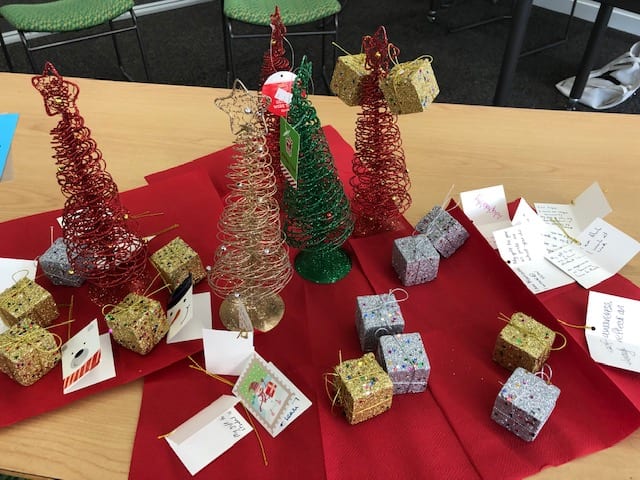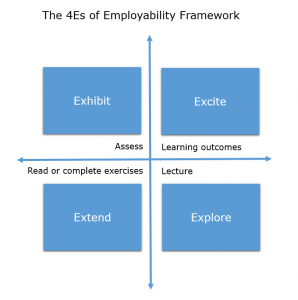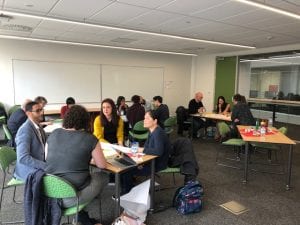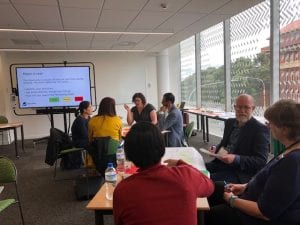By Qian Liu
After nearly two years of research, we have developed a theoretically informed model that aims to help teaching staff incorporate pedagogies that enable the development of employability capabilities. The 2018 TERNZ (Tertiary Education Research in New Zealand) conference marks as the initial dissemination of the model: we collaborated with participants to transform their teaching and at the same time, gauged the adoptability of the model based on participants’ responses. This is the third workshop delivered by our team at TERNZ conferences. In 2016, we helped participants explore employability attributes that graduates need to succeed in an uncertain future. In 2017, we remodelled university teaching and learning so that students from different sociocultural backgrounds can develop their employability through higher education offerings. This year, we focused on embedding employability pedagogies in degree programmes and courses so participants are equipped with tools to engage with employability at the session, course, programme and institutional levels. Susan and Rob facilitated the three-hour workshop with 14 participants. Susan began the workshop by inviting participants to briefly introduce themselves and then prepare an employability gift for their students. Participants individually described their employability gifts on Christmas cards and put them under tiny Christmas trees. This activity helped participants articulate the important employability attributes and skills. Participants believed that adaptability, self-awareness, critical thinking, reflection, and self-confidence are important employability attributes.
Susan then outlined the 4Es model of employability (Enthuse, Explore, Extend and Exhibit) and explained its theoretical foundations: transformational teaching and transfer of learning. As indicated in the figure below, each of the 4Es transforms an aspect of the traditional pedagogical practice commonly seen in university teaching. Although the emphasis on each of the aspects may vary over a semester, together they synergistically shape students’ development of employability. This model captures the complex scholarly conversation on effective higher education pedagogies and affords a simple tool for participants to make sense of and redesign teaching and curricula.
Before applying the model to redesign the current teaching and curricula, participants further learned stories about the positive deviant approach, which we took to explore how exemplary individuals embedded employability into teaching when others found it difficult to do so. These individuals tend to
- Have a motivated mindset
- Take sole responsibility for the holistic development of their students
- Work creatively within their spheres of influence
- Be open-minded and open to continuous learning
- Care about all students and their futures
- Have faith in their students
Susan then shared two sample cases about exemplary individuals to demonstrate how they successfully embedded employability into teaching and curricula. Drawing on the 4Es model and the case studies, participants began to review their courses. They individually identified a course that could be improved, summarised the main learning outcomes and objectives of the course and reviewed the dimensions and teaching techniques that could be improved. Participants then shared their redesign missions in groups.
We provided four different course redesign scenarios for each group and asked them to work out strategies that may develop employability capabilities drawing on the 4Es model. Participants were then told that they have to complete the redesign task in a couple of days and therefore had to prioritise their identified strategies, considering the activities, resources and exhibits. Groups then shared the course redesign scenario and their solutions. This group activity exposed participants to different but practical course redesign problems and helped them collectively utilise the 4Es model as a framework to embed employability. After a short break, participants drew on the group activity to work on their own courses that were identified previously. They reflected on the attributes of their students and described strategies that may work well for their students. They further collected feedback from another participant and tested the credibility of their strategies. To consolidate the workshop into actionable plans, participants engaged with another group activity, ‘Eight Crazy Minutes’, in which they were asked to reflect on the models, exemplars, the group activities and the redesign of their own courses in order to identify eight crazy ideas that may embed employability into curricula and teaching. They then worked in groups to identify three less crazy ideas which may serve as the basis of their action plan in future.
The overall rating of the workshop is 4.7 out of 5 points. The workshop proved to be a success as the following quotes demonstrate:
- ‘Working with others throughout the session kept us engaged. Very well timing.’
- ‘The whole thing was great. Great breadth of focus-from small activities to the strategic level.’
- ‘The activities all supported the use of transformational learning. It was a good mixture of individual and group activities. Small groups were good.’
- ‘The framework is easy to understand and useful.
Interested in attending one of these workshops? We’ll be offering a series of workshops in 2019. Watch this space!





Recent Comments